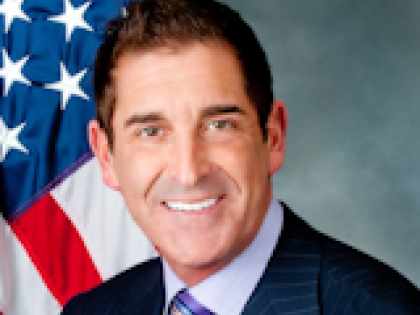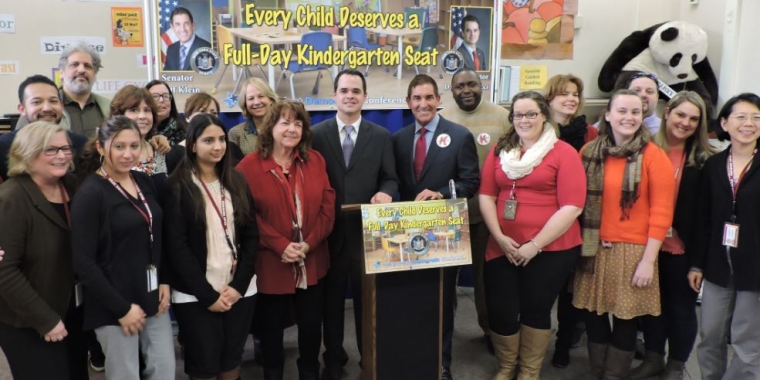
KLEIN & TORRES REVEAL SHOCKING NYCHA DAMAGE SURVEY
March 3, 2016
Low-income residents languish in rotting apartments waiting up to five years for repairs
NEW YORK, NY - Independent Democratic Conference Leader Jeff Klein (D-Westchester/Bronx) and New York City Council Public Housing Chair Ritchie Torres (D-Bronx) stood with advocates and residents to reveal the results of a shocking NYCHA damage survey today.
The Offices of Senator Klein and Councilman Torres, with assistance from the Office of Senator Diane Savino, conducted an extensive survey of NYCHA tenants across the city. The resulting report, “NYCHA 2020: Revitalizing New York City’s Crumbling Public Housing,” exposes disturbing mold-infested units, crumbling ceilings and broken intercoms, with families sometimes waiting for as long as five years for repairs.
“Our report, “NYCHA 2020: Revitalizing New York City’s Crumbling Public Housing” only confirms what we’ve said before: NYCHA is the City’s worst landlord. These are tenants who pay rent and want to take pride in their homes - no one should be expected to languish in a mold-infested home, with leaking ceilings and paint peeling from the walls. We cannot sit back while damage is done to our best affordable housing stock. That is why we are proposing the NYCHA 2020 Public Housing Revitalization Plan, which would increase funding to provide safe, healthy conditions to residents, while reforming NYCHA’s operations and increasing transparency. NYCHA’s system may be broken, but we are ready to fix it,” said Senator Klein.
“These devastating survey findings add to the body of evidence that show state disinvestment in NYCHA has significant impact on residents’ health, safety and well-being. While the findings and statistics are alarming, they are not surprising. Without State support for NYCHA, residents will continue to suffer in their apartments and buildings will deteriorate. It is imperative that the State not only include funding for NYCHA in this year’s budget but also push for the Authority to be accountable for completing critical repair projects. As the single biggest provider of affordable housing in the City, we cannot allow NYCHA’s buildings to fall down around us,” said Councilman Torres.
Over 200 residents were surveyed via a door-to-door to questionnaire where residents were asked about NYCHA’s responsiveness to complaints and the agency’s manner of communication and the physical conditions in apartments and buildings were extensively documented.
Dangerous Disrepair
The report further details the dangerous disrepair of NYCHA buildings. Over 63 percent of surveyed residents reported something damaged or broken in their unit - crumbling walls, peeling paint, falling bathroom and kitchen ceilings, and dysfunctional intercoms. Half of tenants who described a broken intercom have had the problem for over five years.
The extensive damage of units and buildings ultimately impacts the safety and health of residents. During the survey, staff documented egregious violations in building common areas, photographing exposed electrical wiring, mold, and peeling paint.
Residents reported that they felt unsafe in their buildings, with 51 percent saying their building’s condition made them feel unsafe. Of those surveyed, 25.4 percent rated their building as “bad or terrible” and 31.7 percent rated it as “unsatisfactory.”
Mold - Infested Units
The survey illustrates the dangerous mold problems prevalent in many NYCHA apartments, with over 60 percent of tenants surveyed reporting a current or past mold issue. Disturbingly, 18.8 percent of tenants said their complaints were never responded to, while 21.7 percent indicated that they were forced to live with mold while maintenance took over a month to respond. Approximately three-quarters of NYCHA tenants - nearly 74 percent - reported that the mold grew back.
Studies have shown that mold exacerbates asthma and other respiratory conditions. Fifty percent of respondents noted that someone in their household had asthma, with another 30 percent describing other breathing problems.
Calls for Help
Staff also surveyed residents about the responsiveness of NYCHA. When they called for help, residents reported that they received responses with incorrect information 79.2 percent of the time.
Forty-two percent of tenants said that NYCHA did not provide updates as to when a building-wide issue would be fixed, and 66.9 percent said that any information that was provided was wrong.
One mother of two autistic children told surveyors that during storms paint chips rain from her ceiling, leaving her to scramble to clean them before her children can eat the poisonous fragments.
Another resident testified that his mother, a senior citizen, had repeatedly complained about her leaking roof. Maintenance would make shoddy repairs occasionally, but the problem was never properly fixed. She passed away before the roof ever stopped fully leaking.
Revitalizing NYCHA
Last year, the IDC, under the leadership of Senator Klein, was able to secure $100 million in funding to NYCHA. This year, the NYCHA 2020 Public Housing Revitalization Plan would provide $100 million in state funding, with another $100 million in matching City funds. In order for NYCHA to receive the funding, the Authority would be required to adopt a revitalization plan with clearly specified goals and accountability.
To address future funding, future surplus funds from the Battery Park City Authority would be dedicated to NYCHA. Over a decade, this would bring an additional $400 million to NYCHA, according to New York City Comptroller estimates.
Senator Klein additionally sponsored legislation that would build increased transparency by giving the New York City Council oversight, so that the Council is able to demand information about the ongoing conditions of NYCHA buildings.
Another tier in the proposal would establish the NYCHA Repair Certificate Program to provide incentives to private developers to complete critical capital repairs to NYCHA developments in exchange for increased development rights. The program would also simultaneously identify training opportunities for NYCHA tenants, to provide meaningful career development for low-income residents.
“Last year, the IDC was successful in securing $100 million for repairs to NYCHA, but we need more to fix the nightmare conditions that these tenants are forced to live with. We can not leave human beings to live in this deplorable state. That is why we are proposing another $100 million for critical repairs, with increased oversight and transparency. I have been proud to fight for NYCHA residents in the past, and I am proud to continue to work to ensure that these tenants can live in clean, safe, affordable homes,” said Senator Savino.
“We all know the score. Without major infusions of capital--from the state and city--NYCHA won't survive another generation. This is a critical time to reinvest in NYCHA and its residents,” said Victor Bach, Senior Housing Policy Analyst with the Community Service Society.
“In our buildings, we have many seniors with medical issues that require them to be able to get in and out of their building. However, the key fobs have been broken, and so they are unable to freely get in and out. Our residents also need to regularly let in nurses and health aides, but the buzzers don’t work. When the heating is broken, NYCHA will send someone to repair it, but then the heat is off again the next day. These people pay rent, but the door locks have been broken for four months - we don’t want to go another four. I am for Senator Klein’s proposal and support any additional funding to help correct these problems,” said Reverend Oliver of the Middletown Plaza Senior Center in The Bronx.
“NYCHA needs to start doing some repairs, because we have serious problems. Some of our residents have lost their bathroom or kitchen ceilings because of leaks. Living room radiators have been turned off in the winter, because they leak water all over the floor. We had an incident a week ago where a ceiling almost fell in. It was so scary that the resident living below her packed a bag and went to another apartment! We get no answers, they have cut staff, and we don’t even have an exterminator any more. We have been asking for new windows and an electrical upgrade for over 15 years. I absolutely support Senator Klein and Councilman Torres’ proposal to raise funding for NYCHA repairs, and to increase NYCHA oversight,” said Loretta Masterson, tenant leader of the Sack Wern Houses in The Bronx.
“Last year's allotment of $100 million for NYCHA truly showed a message of support; but we need that support to be ongoing. We want to thank the IDC, the New York City Council, Councilmember Ritchie Torres for uplifting our call for continued financial support of this vital housing,” said Ann Valdez, member of Community Voices Heard and NYCHA resident in Brooklyn.
Share this Article or Press Release
Newsroom
Go to NewsroomREPORT: IDC PROPOSES 50-HOUR LEARNING WEEK
February 12, 2016
Klein & Carlucci: Every child deserves a full-day kindergarten seat
February 11, 2016

SENATOR KLEIN HOSTS 21ST ANNUAL “VALENTINE’S FOR VETERANS”
February 10, 2016
